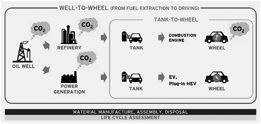HIROSHIMA, Japan — Mazda Motor Corporation announced today it will begin a joint research project with Saudi Aramco and Japan's National Institute of Advanced Industrial Science and Technology (AIST) aimed at making internal combustion engines more efficient and reducing carbon dioxide emissions. Saudi Aramco will develop a fuel with a refinery process that results in lower carbon dioxide emissions, and Mazda and AIST will research and develop a high-efficiency engine that uses the fuel. The initiative is expected to yield technologies that effectively reduce carbon dioxide emissions on a well-to-wheel basis.
Research topic: Development of a low-carbon fuel and research into internal combustion engines using said fuel
Participating organizations: Saudi Aramco, AIST, Mazda

Well-to-Wheel versus Tank-to-Wheel
Mazda is working to reduce its impact on the environment in line with its "Sustainable Zoom-Zoom 2030" vision for technology development, announced in August last year. The plan calls for the automaker to reduce overall carbon dioxide emissions on a well-to-wheel basis, considering everything from fuel extraction through to driving. It is no longer sufficient to focus solely on the tank-to-wheel phase and develop fuel efficient engines and cars that emit low levels of carbon dioxide while driving on the road. Through this research, Mazda will build on a long history of technology development efforts aimed at reducing carbon dioxide emissions. The company hopes to contribute to the conservation of resources and preservation of the environment while offering cars that combine outstanding environmental and safety performance with true driving pleasure to wider range of customers globally.
Reference
¦ Saudi Aramco
http://www.saudiaramco.com/
¦ National Institute of Advanced Industrial Science and Technology
http://www.aist.go.jp/
¦ Mazda's Environmental Initiatives
http://www.mazda.com/ja/csr/environment/